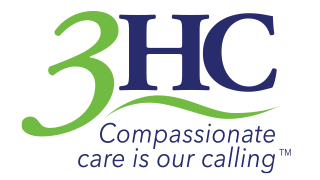Self-care During Grief: Our Guide to Get You Through It
You may feel that there is no time to take care of yourself. You’re trying to do so much for your other family members, take care of arrangements, and work through your own pain, that rest and reflection is nowhere in sight. When you lose someone you dearly love, it’s easy to overlook self-care during grief –but often this is one of the most important elements of the bereavement process.
“Everyone deals with grief in their own way, but we have noticed that often, those who are grieving do not take time to take care of themselves,” said Edith Keesecker, Bereavement Experience Coordinator “Self-care during grief is so vital for helping you process your loss. We have composed this guide to self care because we have seen many of our families go through similar situations. As members of the 3HC family, we believe it is part of our purpose to supply resources you need.”
We’ll take a look at how to take care of yourself, how to get to the other side of grief, and provide information on our bereavement services to help you.
Our Guide to Self-Care During Grief
Grief is a very personal journey. There is no one “right” way to grieve. For some, the process requires deep personal reflection and privacy, while others may be more likely to reach out to their support community.
However you are maneuvering through the grieving process, do not judge your progress or compare yourself to others who are going through something similar.
Your journey is your journey, and it is one worthy of respect.
We have found that the following principles really help you take care of yourself while going through this difficult time.
Support Yourself Physically
Sleepless nights and bouts of intense crying have left you physically and emotionally exhausted. Remember that in order to continue to process grief, it’s important to take care of your physical body.
While you may not feel like engaging in your regular exercise routine, sometimes a nice, quiet walk in nature can help. Continue to seek out nutritious meals. If friends, neighbors or fellow parishioners volunteer to fix meals for you—let them.
While we realize grief can make it difficult to sleep, we encourage you to find time to rest whenever you can
Don’t Go It Alone: Find Support
While you may feel alone during this time, remember that you are not. You are surrounded by friends and family–including your 3HC family–who love you.
We offer extensive grief support services and counseling for the family for 13 months after the death of a loved one. Our bereavement support includes not only access to support groups, but also a monthly newsletter and calls to demonstrate that we are dedicated to you during this most difficult time.
But don’t be afraid to ask for help. Some of the people you can turn to for support during this difficult time may include:
The important element is to remember that you are surrounded by people who love you and are willing to help you on your journey.
Give Yourself Permission to Grieve
So often, we’ve seen families of our patients try to “be strong” for others and not allow themselves the room to grieve.
Allow yourself to feel during this time, and grieve in your own way. Don’t hold it in or delay. This is vital to your emotional health.
Continue Your Routine—But Don’t Be Afraid to Say ‘No’
Often, keeping your regular routine can help. Sure, there will be days when it is harder than others, but as much as possible, try to wake up, eat and go to sleep at your normal times. This is an important element of self-care during grief. At first you may feel as though you are merely “going through the motions,” but in the long run, this self-care tip will help you through your grieving journey.
If a lot of extracurricular activities are a part of your normal routine, or if you’re asked to help out on some new projects, don’t be afraid to say no.
Only you can determine if it’s the right time to jump into more commitments. But be sure to give yourself time. Don’t feel you have to take on everything you did prior to your loved one’s death at this time.
Listen to your body and how you are feeling emotionally and physically. Those who care about you will understand. There is nothing wrong with limiting your obligations during this difficult time.
Turn Toward Your Creativity
We’ve found that many find the arts a healing part of self-care during grief. This may include writing in a journal, listening to music (or playing an instrument). Painting is another good creative outlet.
Remember, you don’t have to create a masterpiece to reap the benefits from this type of arts therapy.
Seek Inspiration From Nature
Often, outdoor activities such as walking or gardening can provide emotional relief and support. In many cases, just simply being outside and in nature can bring about a calming sense of peace. Perhaps there’s a favorite place by a lake or even a beautiful park that makes you feel more serene. Seek these “time outs” from nature.

Try To Minimize Stress
We know that stress is unavoidable, but as much as within your power, try to avoid stressful situations. Sometimes, images or stories seen on TV or on social media can be disturbing or upsetting. In addition, now is not the time to make major, life-altering decisions.
You may also want to implement some of these helpful stress relief tips from the Mayo Clinic.
3HC Is Here to Help You Navigate the Complicated Journey of Grief
Everyone grieves in their own way. As we’ve mentioned before, there is no one way to experience grief, and the process is different for everyone. We encourage you to start your own personal “guide to grief” to ensure that you practice self care during grief. This will enable you to implement the strategies that work best for you.
Let Our Family Help Care for Your Family
Since 1981, 3HC has dedicated itself to caring for North Carolinians from the Triangle area to the coast. Through our grief counseling services and local support groups, we help families during this difficult transition in their lives.
Need to learn more? You can learn more about our grief programs by contacting Edith Keesecker, MA, BSW, our Bereavement Experience Coordinator at (919) 735-1387, ext. 1510 or (919) 437-8039, or by email at: ekeesecker@3HC.org





